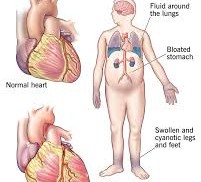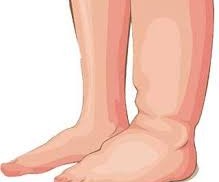Understanding Swelling in Congestive Heart Failure: Causes, Symptoms, and Management


What Causes Swelling in Congestive Heart Failure?
Why does swelling occur in congestive heart failure? Swelling, or edema, is one of the most noticeable symptoms of congestive heart failure (CHF). It happens when the heart becomes too weak or stiff to pump blood efficiently, causing fluid buildup in various parts of the body.
- In CHF, the heart cannot circulate blood effectively.
- Poor circulation leads to fluid accumulation in tissues, especially in the legs, ankles, and feet.
- Fluid may also collect in the lungs, abdomen, or hands.
- This swelling can make everyday tasks difficult and uncomfortable.
- The retention of salt and water by the kidneys worsens fluid buildup.
Understanding the root cause of swelling in CHF is essential for early detection and proper management of the condition.
Signs and Locations of Swelling in CHF Patients
How can patients recognize swelling linked to heart failure?
Edema related to CHF can appear in several areas of the body and often worsens over time if left untreated.
- Most commonly seen in the legs, ankles, and feet.
- May also present in the hands or abdomen (ascites).
- Weight gain due to fluid retention is common.
- Swelling is often more noticeable at the end of the day or after long periods of standing.
- Shortness of breath may indicate fluid in the lungs, a serious complication.
Recognizing the signs early can help patients seek medical help before the condition escalates.
The Role of the Heart and Kidneys in Fluid Retention
Why do the heart and kidneys contribute to swelling?
The heart and kidneys work together to maintain proper fluid balance. In CHF, this partnership breaks down.
- A weakened heart reduces blood flow to the kidneys.
- The kidneys interpret this as dehydration and retain sodium and water.
- Excess fluid leaks into body tissues, causing swelling.
- Increased blood volume adds pressure to the veins, worsening edema.
- The cycle continues unless medical intervention is introduced.
This malfunction illustrates the importance of treating CHF not just as a cardiac issue, but as a systemic one.
Lifestyle Adjustments to Reduce Swelling in CHF
Can lifestyle changes help manage swelling in heart failure?
Yes, in addition to medication, certain lifestyle modifications can play a major role in controlling swelling and improving heart function.
- Reduce sodium intake: High salt levels cause the body to retain water, leading to more swelling.
- Monitor fluid intake: Keeping track of daily fluid consumption can prevent fluid overload.
- Elevate the legs: Raising the legs above heart level helps fluid return to circulation.
- Wear compression stockings: These help prevent fluid from pooling in the lower limbs.
- Track daily weight: Sudden increases may indicate fluid retention.
- Exercise regularly: Light, doctor-approved activity improves circulation and overall cardiovascular health.
These changes, when practiced consistently, can significantly support medical treatment and improve overall wellbeing in individuals living with congestive heart failure.
Impact of Swelling on Daily Life and Health
How does swelling affect quality of life in heart failure patients?
Swelling caused by CHF is more than a cosmetic concern—it greatly interferes with a patient's daily activities and overall health.
- Causes fatigue and limits mobility.
- May lead to skin breakdown, ulcers, or infections.
- Increases the risk of hospitalization and complications.
- Worsens shortness of breath, especially when lying down.
- May result in a feeling of heaviness or tightness in the limbs.
Effective management of swelling can greatly improve comfort and reduce hospital visits.
Managing and Treating Swelling in CHF: The Role of Lasix (Furosemide)
What treatments are available to reduce swelling in CHF?
Diuretics, or water pills, are the primary treatment for swelling in CHF, helping the body eliminate excess fluid.
- Lasix (Furosemide) is a loop diuretic that helps the kidneys remove sodium and water.
- Reduces fluid volume and decreases pressure in the circulatory system.
- Alleviates swelling in the legs, abdomen, and lungs.
- Often prescribed in combination with other heart failure medications.
- Monitoring potassium levels and kidney function is essential during treatment.
Lasix can provide significant relief, but should always be taken under a doctor’s supervision to avoid side effects and ensure proper dosage.
Swelling in congestive heart failure is a critical symptom that signals the body's struggle with fluid balance. Understanding its causes, recognizing early signs, making lifestyle adjustments, and addressing the condition with medications like Lasix can significantly enhance a patient’s quality of life. Early diagnosis and a consistent treatment plan make a meaningful difference in managing the progression of CHF.
Article Post:Editorial Team of RXShop.md
(Updated at Apr 19 / 2025)

